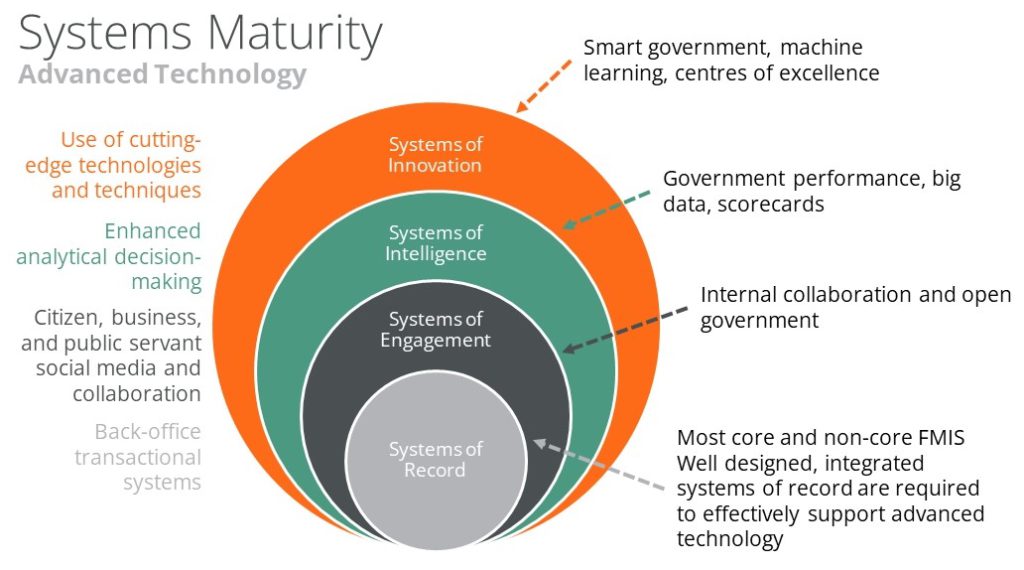Digital transformation has become an imperative for governments worldwide, as their citizens increasingly expect services and information to be available online and on demand. With this shift, there comes an increased need for efficient and effective digital public financial management systems. Enter, systems of intelligence.
What Exactly is a “System of Intelligence”?
Unlike traditional systems of record and systems of engagement, which are typically focused on automating business processes, a system of intelligence goes one step further by incorporating artificial intelligence (AI).
Including artificial intelligence and machine learning capabilities enables governments to harness the power of data-driven insights and recommendations, which can guide leaders towards more informed and effective decision-making. This makes them a compelling choice for driving digital transformation.
Systems of intelligence augment government operations by automating routine and low-value tasks, freeing up public servants to focus on high-value activities that directly impact citizen services. By automating processes through cognitive and machine learning technologies, governments can streamline operations, reduce administrative burdens, and improve the overall efficiency of their public financial management (PFM) systems.
The flexibility of systems of intelligence is also a benefit, as they can adapt and scale to meet the evolving needs of governments.
This is in addition to the real-time monitoring and reporting capabilities which can be expected from a robust digital solution.
Public Financial Management Systems of Intelligence in Practice

There is a wide range of ways in which systems of intelligence can be applied to support effective, efficient and transparent business operations. Here are some examples of practical applications within a government context and the benefits they bring:
Augmented Government and Citizen Services
The use of cognitive and machine learning technologies to accelerate processes is the emerging “smart” opportunity in the public sector. This includes support of chatbots for citizen interaction, conversational user interfaces for citizen services, and Robotic Process Automation (RPA) to assist public servants.
Augmented government processes automates routine and low-value tasks, enabling public servants to focus on high-value tasks to improve citizen services. However effective usage of this relies on accurate data held in systems of record.
Trusted Government and Increased Transparency
By implementing systems of intelligence, governments can achieve a comprehensive 360-degree view of their financial activities, demonstrating accountability and value for taxpayer money. These systems allow for real-time monitoring and reporting of financial transactions, ensuring transparency and enabling governments to deliver on their promises of efficient and responsible use of public funds. The outcome of transparency, open government, efficiency, and improved decision-making is increased trust.
Hyper-Converged and Flexibility in IT Deployments
Advanced software deployment through hyper-converged infrastructures (HCI) allows governments to achieve economies of scale. This is the next generation of cloud computing and promises unparalleled flexibility and management through software-defined networks. HCI allows governments to optimize the deployment of digital solutions, ensuring efficient resource utilization and scalability. By harnessing the power of HCI, governments can streamline their IT operations, reduce costs, and ensure the smooth functioning of their PFM systems.
Intelligent GRP and Big Data Analytics
Governments generate vast amounts of data, and systems of intelligence analyze patterns and trends within this data. Intelligent Government Resource Planning (GRP) provides big data analytics for decision-makers and leverages activity feeds such as software log files, emails, IoT updates, and social media feeds.
Tapping into these diverse data sources provides decision-makers with a holistic view of government operations, and machine learning enables patterns within the data to be analyzed and presented using advanced visualization techniques. This better equips leaders to make informed, data-driven decisions in real-time.
Implementing a System of Intelligence with FreeBalance
As governments strive to deliver efficient, citizen-centric services, systems of intelligence are undeniably an indispensable choice for unlocking the true potential of digital public financial management. By automating processes, providing data-driven insights, and enabling informed decision-making, these systems empower governments to deliver efficient, transparent, and citizen-centric services.
FreeBalance can help governments take advantage of these opportunities, and realize the benefits of digital transformation. set up a call with our PFM experts to find out more.
